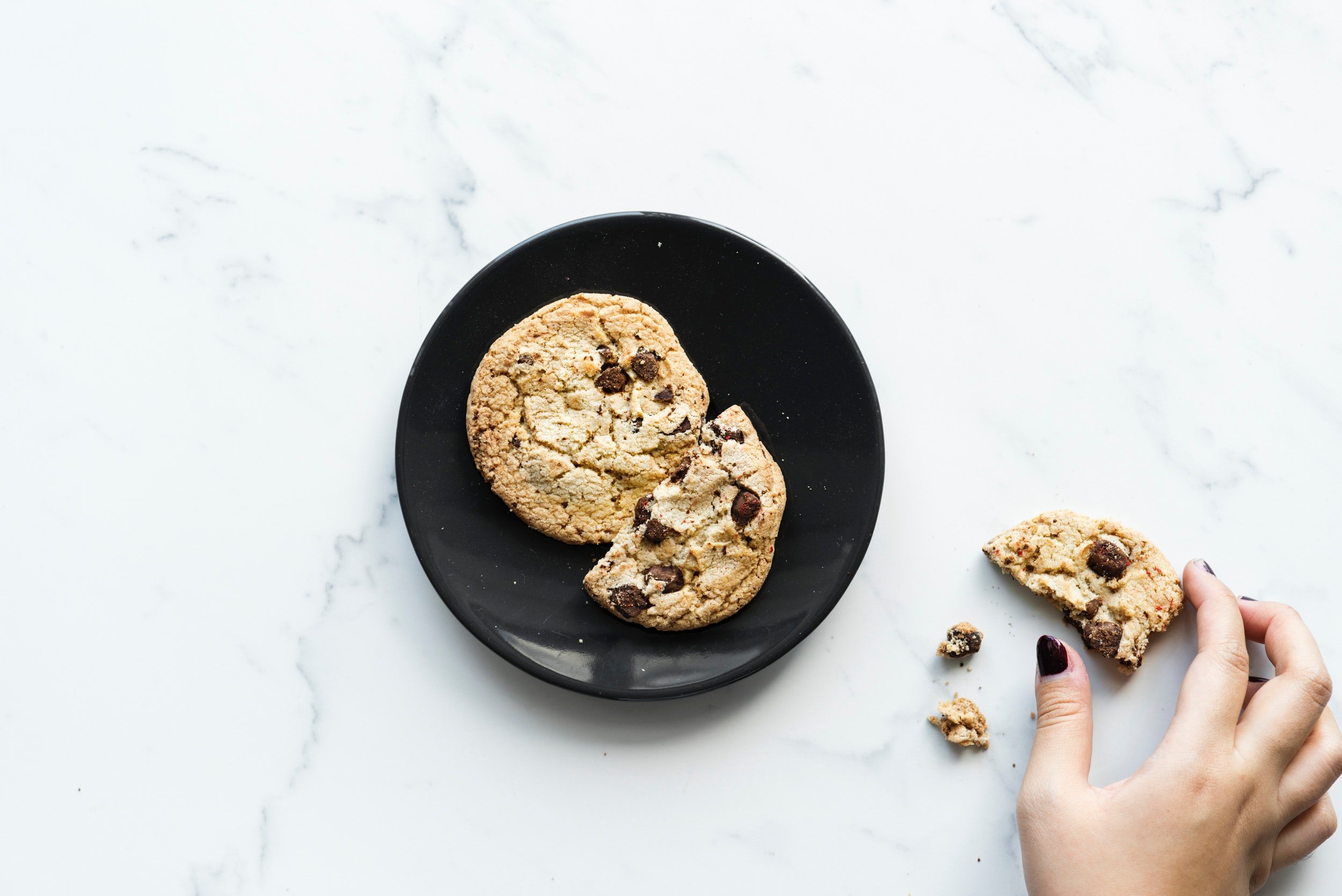So, you’ve just spent the last few weeks trying to lose weight, yet, no progress. 🤔 You rack your brain trying to figure out what you did wrong but can’t help feeling defeated. To your knowledge, you’ve done everything you’re supposed to do, so why isn’t it working?! 😫😤 What most people don’t realize is that weight loss is a lot trickier than it seems.
Losing weight is really a matter of balancing the proper ratio of calories-in versus calories-out, so how can it be confusing? Well, bad eating habits and a poor diet are typically responsible for the lack of progress. What’s interesting, is that some people aren’t even aware they have bad eating habits which make breaking them even more difficult. So, if you’re wondering how to break bad eating habits… read on, because these are 7 of the worst bad eating habits that prevent weight loss, and how to break them!

7 Bad Eating Habits (& How To Fix Them)
Like I said before, if you aren’t aware of your bad eating habits, how can you possibly be expected to change them? The first thing to do is to take a second to reflect on your day. What does your day look like? Is it busy? Stressful? Rushed? Your day-to-day schedule, moods, etc., can play a role in unconscious eating habits that can sometimes cancel out all the work you’re doing in the gym. So paying attention to the little details can help you identify where you’re falling short. Here is a list of the most common bad eating habits and how you can fix them.
1. The Mindless Eater
Nowadays, people are busier than ever, and multitasking is the best way for people to save time. Reflecting back on the last few days, have you ever been relaxing on your couch watching TV, reading, working, or just scrolling through your social media feeds while you’re eating? This is one of the most common bad eating habits because when your attention is focused on a whatever task you’re in, you aren’t focusing on what you’re eating, which can be dangerous if you are trying to lean out.
Zoning out can cause you to overeat without even realizing it. According to Brian Wansink, a professor at Cornell University and author of Mindless Eating, says that people who eat while watching television eat an average of 20-60% more than if they were focused on their food [1].
How To Fix:
If you regularly zone out while you’re eating, your best bet would be to find out what triggers you to zone out and then avoid eating at those times. That might mean not eating in front of the TV, turning your phone on airplane mode during a meal, or simply practicing mindful eating.
2. The Weekday Perfectionist Turns Weekend Binger
If you have a fairly routine weekday schedule, oftentimes, your meal schedule is just as dialed, leaving very little wiggle room for eating junk or extra calories. A common mentality for weight loss is that you have to eat clean and work hard in order to “earn your cheat day”—(which, in theory, makes sense) but this mentality can cause you to be overly restrictive during the week and can lead to binge eating over the weekend—essentially undoing all of the hard work you put in during the week.
How To Fix:
According to Clinical Nutritionist, Tara Coleman, “ The potential benefit of having a cheat day is that it can teach you that deviation from a meal plan or way of eating is not the end of the world. Again, in theory, you can learn that nutrition isn’t a destination, but rather a management issue, so learning flexibility is key. The risk is that rather than teaching flexibility, it usually teaches a black or white mentality, i.e. when I’m “on” or “good” I eat this way, and when I’m “off” or “bad” I eat that way. This (mentality) keeps people stuck in weight cycling.”
The takeaway here: allow yourself to enjoy a little bit here and there no matter what day of the week it is. Flexibility in moderation is always best.

3. The Serial Snacker
We all know em’ and we all love em’—they’re the ones who always have food! But serial snacking can be a major downfall for anyone looking to lose weight because you’re more likely to overeat. Having small snacks between meals is fine, but consistent snacking makes it easy to lose track of what you’re eating.
How To Fix:
Increasing your protein intake helps to keep you feeling fuller for longer and curbs your appetite between meals. For a simple protein-packed snack try making these no-bake, healthy carrot cake energy bites! This recipe requires absolutely no baking, has no unnecessary calories or added sugar, and is PACKED with healthy nutrients, protein, and collagen; making this the most delicious and simple protein cake bites you’ll ever have.
Additionally, you can crush cravings and accelerate fat loss by taking an appetite suppressant, like SkinnyFit Snack Attack, to help prevent overeating and burn fat where it counts!
4. You Eat Your Feelings
We’ve all been there before, but it’s important to leave your feelings at the door when it comes to food. Food is meant to fuel and nourish our bodies for activity and movement and should not be used as a safety blanket and comfort when we aren’t feelin’ 💯.
In times like these, people typically turn to carb-heavy foods which actually cause the body to release insulin, which releases tryptophan into the blood and boosts serotonin levels. Serotonin is a neurotransmitter that increases your mood, but only temporarily,—so when we “eat our feelings” so to speak, it might be comforting and feel good at the moment, but you know what they say… a moment on the lips, forever on the hips!
How To Fix:
If you identify as an emotional eater or turn to food for comfort, you might want to try food journaling. Keeping a food journal will not only help you keep track of what you are eating and in what quantity, but it will also give you an opportunity to reflect on your emotions and feelings at the moment you’re eating.
Here are some questions to think about while you’re doing this— Am I hungry? Am I bored? Am I stressed? Am I sad/lonely? Am I angry/upset? Taking the time to really pinpoint your emotional triggers can help you control your food intake and create a healthier relationship with food in the long run. (This worked wonders with my personal training clients!)
5. Always On The Go
Whether you are a convenience food queen or you’re always eating your food in the car, eating on the go is another one of the worst bad eating habits that can lead to overeating. Similar to mindless eating, you’re most likely distracted with another task when you’re on the go— driving, walking, working, etc.
How To Fix:
If you’re always eating on the go chances are you have a very busy schedule, so treat your eating habits as you would a task in your schedule. Actually, schedule time to eat. It might sound weird carving some time into your schedule to eat, but sometimes it’s what needs to happen in order to break this habit.
You might also benefit from prepping your meals in advance. Meal prepping is a great way to eat healthy while managing a busy schedule. You can pre-portion your food to fit your activity level and goals to ensure you aren’t overeating.

6. You’re A Sucker For “Halo-Foods”
The health halo effect refers to the act of overestimating the healthfulness of a food based on certain claims such as “low-calorie”, “fat-free”, and “low-fat”. It’s also common for people to put a health-halo around foods that claim to be “organic”, when in fact, an organic claim doesn’t necessarily relate to the level of healthfulness. I’ve worked with many clients who believed that if they bought their groceries at health food stores like Trader Joe’s or Whole Foods that it was a free-for-all and anything they bought was “healthy”.
How To Fix:
Regardless of where you purchase your groceries or whatever claims the packaging makes, you should always check the nutrition label and the ingredient list! Being aware of what you’re putting in your body will help you make better choices overall. It’s important to educate yourself on what food label claims actually mean as many of them can be very misleading!
7. You’re An Out-Of-The-Box Eater
Another way to unknowingly eat more calories than you need is if you are consistently eating out of the bag/box/carton, etc. If you are the type to grab a bag of chips and just go to town, chances are you’re eating wayyyyyyyy more calories than you need. Eating out of the box can certainly help you cut down on dirty dishes, but it does some serious damage to your waistline.
How To Fix:
Keeping measuring cups inside boxes like cereal, crackers, etc. can help you grab the proper portion without too much effort. If your vice is something like chips or cookies, check the serving size beforehand and use a small plate to portion your food. Doing this will significantly cut unnecessary calories out of a poor diet.
How To Boost Your Weight Loss
Learning how to break bad eating habits can be a challenge in and of itself. SkinnyFit products, however, are designed with the unique metabolic needs of women in mind. Our all-natural line of wellness products is scientifically formulated to supercharge your weight loss in a healthy, sustainable manner.
Our best-selling Detox, for example, helps rid your body of toxins, shed water weight, and boost your metabolism making it even easier to reach your weight loss goals!

Resources
[1] Wansink, Brian. Mindless Eating. Hay House UK Ltd, 2011.